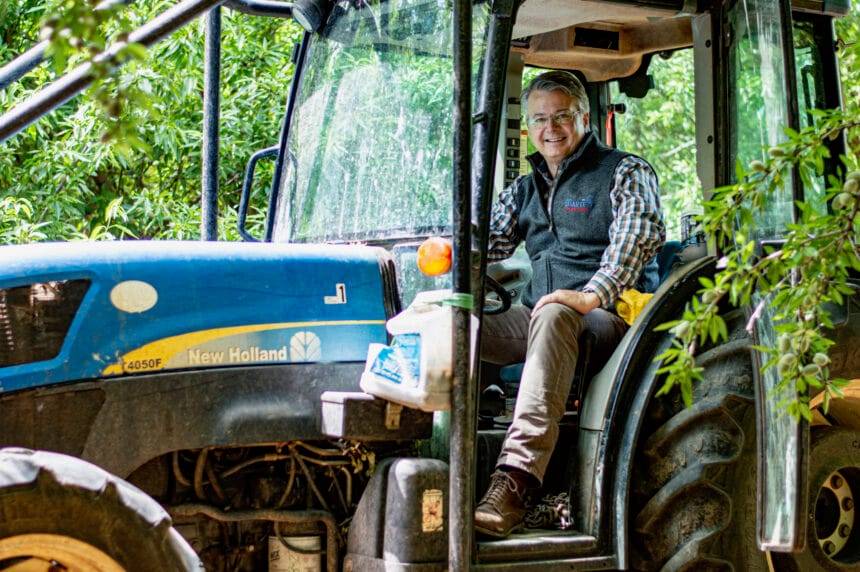Main Points In Hindi (मुख्य बातें – हिंदी में)
-
चीनी टैरिफ और अमेरिकी किसान: कैलिफोर्निया के प्रतिनिधि जॉन डुआर्टे ने बताया कि 2018 में शुरू हुए व्यापार युद्ध के कारण चीन ने अमेरिकी कृषि उत्पादों पर भारी टैरिफ लगाए, जिससे अमेरिकी किसानों को वित्तीय संकट का सामना करना पड़ा है। इस स्थिति से निपटने के लिए डुआर्टे लगभग 6 बिलियन डॉलर के सब्सिडी कार्यक्रम पर विचार कर रहे हैं।
-
उच्च ब्याज दरों का प्रभाव: डुआर्टे ने कहा कि मौजूदा आर्थिक स्थिति, जिसमें उच्च ब्याज दरें और कमोडिटी कीमतों में गिरावट शामिल हैं, किसानों को अपने परिचालन के लिए उधार लेने में मजबूर कर रही हैं, जिससे कृषि ऋण अत्यधिक बढ़ रहे हैं।
-
दिवालियापन के जोखिम: किसानों की वित्तीय स्थिति में गिरावट के कारण, कई किसान दिवालियापन के कगार पर खड़े हैं। इस संकट का असर न केवल व्यक्तिगत किसानों पर, बल्कि पूरे कृषि उद्योग पर पड़ रहा है।
-
सीसीसी की भूमिका: डुआर्टे ने सुझाव दिया है कि कृषि क्षेत्र के समर्थन के लिए कमोडिटी क्रेडिट कॉर्पोरेशन (सीसीसी) को आवश्यक टैरिफ लागत का एक चौथाई हिस्सा उठाना चाहिए, जिससे अमेरिकी किसान प्रतिस्पर्धा में बने रह सकें और अपने उत्पाद बेच सकें।
- मौजूदा चुनौतियाँ: चीन के कृषि उद्योग में निवेश बढ़ने के कारण डुआर्टे ने चेतावनी दी है कि अमेरिका को वैश्विक बाजार में प्रतिस्पर्धा का सामना करना पड़ेगा, विशेषकर ब्राजील और ऑस्ट्रेलिया जैसे देशों से, जो अमेरिकी बाजार हिस्सेदारी को भरने के लिए तैयार हैं।
Main Points In English(मुख्य बातें – अंग्रेज़ी में)
Here are the main points from the article discussing Congressman John Duarte’s plan to support American farmers affected by long-standing Chinese tariffs:
-
Impact of Chinese Tariffs: The article highlights that retaliatory tariffs imposed by China in response to U.S. trade policies have severely affected American farmers, leading to a surplus of agricultural products in the U.S. and a significant decline in commodity prices.
-
Duarte’s Subsidy Proposal: Congressman John Duarte, a fourth-generation farmer, is advocating for a nearly $6 billion subsidy program to support American agricultural producers. The goal is to alleviate the financial strain caused by these tariffs and help farmers avoid bankruptcy.
-
Rising Agricultural Debt: The financial state of farmers is worsening, with a projected 40% drop in net agricultural income compared to 2022. The increased operational loans and high commodity inventories are making it difficult for farmers to sustain their operations.
-
Need for Continued Exports: Duarte believes that by subsidizing a portion of the tariff costs, farmers can resume exporting goods to China at competitive prices, which could help stabilize commodity prices and reduce inventory levels.
- Long-term Competitiveness Issues: The article warns that if U.S. farmers do not receive timely support, they may lose market share to competitive agricultural industries in countries like Brazil and Australia, which are increasing their agricultural exports to China.


Complete News In Hindi(पूरी खबर – हिंदी में)
रिपब्लिकन कैलिफोर्निया के प्रतिनिधि जॉन डुआर्टे ने बुधवार को डेली कॉलर न्यूज फाउंडेशन के साथ एक विशेष साक्षात्कार में लंबे समय से चले आ रहे चीनी टैरिफ के कारण अमेरिकी किसानों को संभावित वित्तीय बर्बादी से बचाने के लिए अपनी योजना का खुलासा किया।
चीन ने कई अमेरिकी कृषि उत्पादों के खिलाफ जवाबी कार्रवाई शुरू की व्यापार युद्ध 2018 में ट्रम्प प्रशासन के साथ तनाव बढ़ गया, जिसके परिणामस्वरूप plummeting देश में निर्यात और अमेरिकी इन्वेंट्री की भरमार ने घरेलू कमोडिटी की कीमतों पर असर डाला है। अब डुआर्टे – ए चौथी पीढ़ी किसान जो देश का सबसे अधिक प्रतिनिधित्व करता है उत्पादक कृषि क्षेत्र – चीनी आर्थिक नाकेबंदी के निरंतर प्रभाव के बीच लगभग 6 बिलियन डॉलर के सब्सिडी कार्यक्रम के माध्यम से अमेरिकी उत्पादकों को दिवालियापन के कगार से बाहर निकालने की कोशिश कर रहा है। (संबंधित: असफल डेमोक्रेट उम्मीदवार ने हाउस सीट के लिए एक और बोली शुरू की)
“[Following the retaliatory tariffs] किसानों ने उन उत्पादों का बड़ा भंडार बनाना शुरू कर दिया जिन्हें विदेशों में नहीं भेजा जा रहा था,” डुआर्टे ने डीसीएनएफ को समझाया। “शुरुआत में, यह ट्रम्प प्रशासन के प्रारंभिक बाजार सुविधा कार्यक्रम के साथ पूरा किया गया था, जिसने प्रतिशोध के कुछ प्रभावों को ऑफसेट करने के लिए किसानों को लगभग 23 बिलियन डॉलर आवंटित किए थे। [agricultural] सामान्य व्यापार युद्ध में टैरिफ जो हुआ।

कांग्रेसी डुआर्टे कैलिफोर्निया के मोडेस्टो में अपने खेत में ट्रैक्टर चलाते हैं (फोटो प्रतिनिधि डुआर्टे के कार्यालय के सौजन्य से)
चीन ने जुलाई 2018 में लगभग 22.5 बिलियन डॉलर मूल्य के कृषि उत्पादों पर टैरिफ लॉन्च किया प्रतिशोध टैरिफ के लिए उगाहना पूर्व राष्ट्रपति डोनाल्ड ट्रम्प द्वारा स्टील और एल्युमीनियम पर एक बोली चीन को बौद्धिक संपदा की चोरी पर नकेल कसने के लिए। इसके बाद ट्रम्प ने एक “बाज़ार सुविधा कार्यक्रम” लॉन्च किया वितरित किसानों के नुकसान का मुकाबला करने के लिए 2018 और 2019 में $23 बिलियन।
“कुछ हद तक, [the market facilitation program] अल्पावधि में बहुत अच्छा था, लेकिन इसके कारण उद्योग अगले एक या दो वर्षों तक बाजार की स्थितियों पर प्रतिक्रिया देने में विफल रहा, इसलिए क्षमता बनी रही,” डुआर्टे ने आगे कहा। “किसान उत्पादन करते रहे, और भंडार बड़ा होता गया क्योंकि शुरुआती व्यापार प्रभावों का दर्द महसूस नहीं हुआ। अब, इन्वेंट्री ऊंची है और कमोडिटी की कीमतें गिर रही हैं, जिससे किसानों को ऊंची ब्याज दरों के समय अपनी संपत्ति और परिचालन के बदले उधार लेने के लिए मजबूर होना पड़ा है, जिससे कृषि ऋण अब तक के उच्चतम स्तर पर पहुंच गया है।
अमेरिकन फार्म ब्यूरो फेडरेशन की अर्थशास्त्री सामंथा अयूब के अनुसार, इस वर्ष शुद्ध कृषि आय 2022 के स्तर से लगभग 40% गिरने का अनुमान है, 2024 की पहली तिमाही में कृषि परिचालन ऋण में साल-दर-साल लगभग 15% की वृद्धि होगी। बताया अगस्त में मिशिगन फार्म समाचार। किसानों की वित्तीय भलाई में कमी वैश्विक आपूर्ति श्रृंखलाओं के कारण आई है समायोजित यूक्रेनी निर्यात में गिरावट के कारण कई कृषि वस्तुओं की कीमतें गिर गईं ठंडाजब मुद्रास्फीति के लिए समायोजित किया गया तो औसत नाममात्र मकई और सोयाबीन की कीमतें फरवरी 2006 के बाद से क्रमशः दूसरे और चौथे सबसे निचले स्तर पर थीं।
डुआर्टे ने अपने कई निजी मित्रों को निम्न जैसे वर्तमान तनावों के बीच दिवालियापन के कगार पर धकेलते हुए देखा है कमोडिटी की कीमतेंऊपर उठाया हुआ ब्याज दरें और फुलाया उर्वरक लागत, जिसमें किसान और कैलिफोर्निया के पूर्व विधानसभा सदस्य भी शामिल हैं बिल बेरीहिल.
“बिल बेरीहिल एक है सर्वोत्तम नस्ल का किसान. उन्होंने नवप्रवर्तन किया है. उन्होंने टेक्नोलॉजी को अपनाया है. उन्होंने पीढ़ी-दर-पीढ़ी अन्य किसानों को अधिक कुशल बनने, बाजार को सीखने और वैध निर्णय लेने के लिए सलाह दी है। और यहां तक कि वह और उसका परिवार भी अपने अंतिम वर्ष में हैं,” डुआर्टे ने डीसीएनएफ को बताया। “मैं अपने पूरे समुदाय में बैंकरों और सर्वोत्तम नस्ल के किसानों के साथ बैठा हूँ। जो लोग अवकाश गृह या फैंसी हवाई जहाज नहीं खरीद रहे हैं। जो किसान अपने परिचालन में निवेश करते हैं, नवप्रवर्तन करते हैं, एक-दूसरे से बात करने और सीखने के लिए समय निकालते हैं। मौजूदा मुद्रास्फीति और कमोडिटी मूल्य निर्धारण की स्थिति में खुद को बनाए रखना संरचनात्मक रूप से असंभव हो गया है, और हम इसे बैंकों से समग्र रूप से सुन रहे हैं।
हालाँकि, डुआर्टे का मानना है कि वह अमेरिकी किसानों के लिए आर्थिक आपदा को टाल सकते हैं, उन्होंने डीसीएनएफ को बताया कि वह चाहते हैं कि किसान प्रतिस्पर्धी कीमतों पर चीन को माल निर्यात करना जारी रखें। कमोडिटी क्रेडिट कॉर्पोरेशन (सीसीसी) – एक सरकारी स्वामित्व वाला निगम जो अमेरिकी कृषि क्षेत्र को समर्थन देने के लिए वित्तपोषण प्रदान करता है – इसे वित्तीय रूप से व्यवहार्य बनाने के लिए टैरिफ लागत का एक चौथाई तक भुगतान करता है। उनका तर्क है कि इस कदम से किसानों को अपने स्टॉक की बहुतायत को बेचने की अनुमति मिलेगी, जिससे कमोडिटी की कीमतें बढ़ेंगी।
“मैं जो मानता हूं वह हाथ में है [Biden-Harris] प्रशासन को बाजार सुविधा प्रतिशोध के लिए सीसीसी से लगभग $6 से $7 बिलियन का निवेश करना है [agriculture] टैरिफ अनुपूरक और मूल रूप से प्रतिशोधात्मक टैरिफ के मूल्य का 25% तक बैकफ़िल जो किसानों को चीन से बाहर भुगतना पड़ रहा है।
कांग्रेसी को यह भी उम्मीद है कि सब्सिडी कार्यक्रम ब्राजील और ऑस्ट्रेलिया जैसे देशों को अपने कृषि उद्योगों को मजबूत करने और आने वाले वर्षों में अमेरिका से बाजार हिस्सेदारी लेने से रोकने में मदद करेगा।
डुआर्टे ने डीसीएनएफ को बताया, “चीन अमेरिकी कृषि वस्तुओं को प्रतिस्थापित करना चाहता है जहां उनके पास अच्छे विकल्प हैं।” “हम देख रहे हैं कि अन्य देश, अर्थात् ऑस्ट्रेलिया और ब्राज़ील, शून्य को भरने के लिए अपने कृषि उद्योगों को बढ़ा रहे हैं [left by the decline in U.S. exports]. ये पूंजी निवेश काफी स्थिर रहने वाले हैं, जिसका अर्थ है कि हमें भविष्य में इन देशों के खिलाफ प्रतिस्पर्धा करनी होगी, इसलिए जब कीमतें या प्रतिशोध भी होंगे [agricultural] टैरिफ से राहत मिली है, हमारे पास अभी भी प्रतिस्पर्धा करने के लिए अच्छी तरह से पूंजीकृत, स्थापित खिलाड़ियों की चुनौती होगी जो शायद वहां नहीं होते अगर पिछले सात या आठ वर्षों में टैरिफ से हमें नुकसान नहीं हुआ होता।
ब्राज़ील ने 2018 में चीन को सोयाबीन सब्सिडी निर्यात में लगभग 4 बिलियन डॉलर की वृद्धि देखी – जिस वर्ष टैरिफ लगाया गया था, अनुसार अमेरिकी कृषि विभाग की जनवरी 2022 की रिपोर्ट के लिए। इस बीच, चीन को अमेरिकी कपास निर्यात में 400 मिलियन डॉलर की गिरावट आई, अध्ययन में पाया गया कि ब्राजील और ऑस्ट्रेलिया जैसे प्रतिस्पर्धी निर्यातक इस अंतर को भर रहे थे।
“विश्व व्यापार संगठन (डब्ल्यूटीओ) में चीन को अनुमति दिए जाने की बहुत आलोचना हो रही है। डुआर्टे ने डीसीएनएफ को बताया, “हमें इस तरह का उत्साहपूर्ण अहसास था कि अगर हमने उन्हें अमीर बना दिया, तो वे आजादी की मांग करेंगे और एक अधिक स्वतंत्र समाज हासिल करेंगे।” “चीजें उस तरह से नहीं चल रही थीं, इसलिए हमने अदालत में चीन से लड़ने में पांच साल बिताए और केस जीता। फिर उन्हें जवाबी कार्रवाई छोड़ने का निर्देश दिया गया [agriculture] विश्व व्यापार संगठन की अदालतों में टैरिफ और ऐसा नहीं किया है।
विश्व व्यापार संगठन शासन 16 अगस्त 2023 को चीन की जवाबी कार्रवाई टैरिफ अंतर्राष्ट्रीय व्यापार नियमों के साथ “असंगत” थे, लेकिन देश ने नीतियों को वापस लेने से इनकार कर दिया है। एक विश्लेषण इकोनॉमिक पॉलिसी इंस्टीट्यूट ने पाया कि अमेरिकी व्यापार घाटे के परिणामस्वरूप 2001 – जिस वर्ष चीन डब्ल्यूटीओ में शामिल हुआ – और 2018 के बीच 3.7 मिलियन अमेरिकी नौकरियों का नुकसान हुआ।
डुआर्टे ने डीसीएनएफ को बताया, “चीन को पहले ही डब्ल्यूटीओ में शामिल नहीं किया जाना चाहिए था, और तब से उन्होंने विश्व व्यापार, मुद्राओं और अपने बाजारों तक पहुंच में हर संभव तरीके से हेरफेर किया है।” “अब अमेरिकी नीति निर्माताओं को दस्ताने उतारने की जरूरत है।”
डेली कॉलर न्यूज़ फ़ाउंडेशन, एक स्वतंत्र और गैर-पक्षपाती न्यूज़वायर सेवा, द्वारा बनाई गई सभी सामग्री किसी भी वैध समाचार प्रकाशक के लिए बिना किसी शुल्क के उपलब्ध है जो एक बड़ा दर्शक वर्ग प्रदान कर सकता है। सभी पुनर्प्रकाशित लेखों में हमारा लोगो, हमारे रिपोर्टर की बायलाइन और उनकी डीसीएनएफ संबद्धता शामिल होनी चाहिए। हमारे दिशानिर्देशों या हमारे साथ साझेदारी के बारे में किसी भी प्रश्न के लिए, कृपया licensing@dailycallernewsfoundation.org पर संपर्क करें।
fbq('init', '1660572110829759');
fbq('set','agent','tmgoogletagmanager', '1660572110829759');
Complete News In English(पूरी खबर – अंग्रेज़ी में)
Republican Representative John Duarte from California recently shared his plan to protect American farmers from financial ruin due to long-standing Chinese tariffs in an exclusive interview with the Daily Caller News Foundation.
In response to trade tensions with the Trump administration, China initiated retaliatory tariffs on several American agricultural products in 2018, resulting in a significant decline in U.S. exports and affecting domestic commodity prices. Now, Duarte, a fourth-generation farmer representing the fertile agricultural region, is attempting to use a $6 billion subsidy program to help American producers avoid bankruptcy amidst the ongoing effects of China’s economic sanctions. (Related: Failed Democrat candidate launches another bid for House seat)
Duarte explained to DCNF, “Following the retaliatory tariffs, farmers began stockpiling products that were not being exported. Initially, this was offset by the Trump administration’s market facilitation program, which allocated nearly $23 billion to ease the impacts of the trade war tariffs.”

Congressman Duarte driving a tractor on his farm in Modesto, California (Photo courtesy of Representative Duarte’s office)
In July 2018, China imposed tariffs on around $22.5 billion worth of agricultural products in retaliation for tariffs placed on steel and aluminum by former President Donald Trump. To counter the losses incurred by farmers, Trump launched a market facilitation program, distributing $23 billion between 2018 and 2019 to help mitigate these impacts.
Duarte noted, “To some extent, the market facilitation program was helpful in the short term, but it failed to prepare the industry for market changes in the following years, resulting in increased inventory and declining commodity prices.” He added that high interest rates are forcing farmers to borrow more against their properties and operations, driving agricultural loans to historic highs.
According to economist Samantha Ayub from the American Farm Bureau Federation, net agricultural income is expected to drop by nearly 40% from 2022 levels this year, with agricultural operating loans projected to rise by about 15% year-over-year in the first quarter of 2024.
Duarte has witnessed several friends from the farming community facing bankruptcy due to factors such as falling commodity prices, rising interest rates, and increased fertilizer costs, including former California state assembly member Bill Berryhill.
Duarte said of Berryhill, “He’s a top-notch farmer who has innovated and adopted technology. Even he and his family are now struggling.” Duarte stated, “I’m meeting with bankers and exceptional farmers who focus on investing in their operations and learning from one another. However, maintaining viability in the current inflation and commodity pricing environment has become nearly impossible, and banks are echoing this concern.”
Despite the challenges, Duarte believes he can avert economic disaster for American farmers and wants them to continue exporting goods to China at competitive prices. He argues that the Commodity Credit Corporation (CCC) should cover up to 25% of tariff costs to make these exports financially viable. He believes this would allow farmers to sell their surplus stock and stabilize commodity prices.
Duarte emphasized, “I believe it’s necessary for the [Biden-Harris] administration to invest around $6 to $7 billion into the CCC to cover the agricultural tariff losses and offset the costs that farmers are facing from China’s tariffs.”
He hopes that this subsidy program will prevent countries like Brazil and Australia from strengthening their agricultural sectors and seizing market share from the U.S. in the coming years.
“China wants to replace American agricultural products if they have good alternatives,” Duarte said. “We’re seeing nations like Australia and Brazil bolstering their agricultural industries to fill the gaps left by declining U.S. exports. This capital investment is likely to remain steady, meaning we will need to compete against well-capitalized competitors in the future.”
In 2018, Brazil saw a nearly $4 billion increase in soybean subsidies to China—the same year tariffs were imposed—while U.S. cotton exports to China decreased by $400 million as competitors like Brazil and Australia filled that gap.
Duarte expressed criticism over China’s membership in the World Trade Organization (WTO), stating, “We had this enthusiastic feeling that by making them wealthy, they would demand freedom and create a more open society. Things didn’t turn out that way, so we spent five years fighting China in court and won our case. Then they were instructed to lift their retaliatory tariffs, which they have not done.”
The WTO ruled on August 16, 2023, that China’s retaliatory tariffs were “inconsistent” with international trade rules, yet the country has refused to withdraw these policies. An analysis by the Economic Policy Institute indicated that the U.S. lost 3.7 million jobs between 2001, when China joined the WTO, and 2018 due to the U.S. trade deficit.
Duarte remarked, “China should never have been allowed into the WTO; since then, they have manipulated global trade, currencies, and access to their markets. Now, American policymakers need to take off the gloves.”
All content created by the Daily Caller News Foundation, an independent and nonpartisan newswire service, is available free of charge for any legitimate news publisher that can provide a large audience. All republished articles must include our logo, the reporter’s byline, and their DCNF affiliation. For any questions regarding our guidelines or partnerships, please contact licensing@dailycallernewsfoundation.org.






